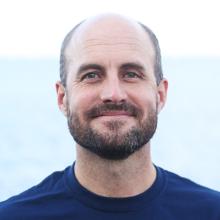
Andrew Thurber
Tell us about your work/research. What kinds of things do you do?
I study how oceans work to understand how they impact society and keep the planet healthy. I specialize in understanding how microbes fit into our overall understanding of the ocean ecosystem and in particular how they interact with animals. I have been studying deep-sea methane seeps for 15 years as these are places where methane, a really potent greenhouse gas, is leaking from the seafloor. At these seeps, the methane is eaten by bacteria and archaea keeping it out of our atmosphere. It also provides food for the deep ocean. I am captivated by the diversity of habitats in the ocean and employ an equally diverse suite of techniques to study them, from SCUBA diving in under the ice in Antarctica and the tropics, to deep-sea expeditions using submersibles and remote operated vehicles, to experiments in aquaria and on lab benches. I also really enjoy talking about science with the public to convey how important the deep sea is to us all.
What sparked your initial interest in your career?
I always wanted to study the ocean. When I was 5 I talked about how I wanted to be an ocean scientist and that has not changed. As I took classes I was more and more intrigued about ecology, the interactions between different species, communities, and their environment. The challenge of viewing these interactions holistically seemed like a grand challenge with endless questions. Along my path, I got an opportunity to look at animals that live in the mud, and that changed my career. It is essentially an entire ecosystem in every scoop of mud that you can interrogate to see how the various interactions result in different functions: removing nutrients, eating greenhouse gases, and storing carbon are all examples of what microbes and animals do in the marvelous mud of the oceans. Deep-sea mud covers more than 63% of the globe and we are still understanding how this ecosystem exists and persist.
Who influenced you or encouraged you the most?
My career has been influenced by more people than can be listed. Among the most influential were Drs. Eric Vetter and Craig Smith, who gave me my first opportunities for hands-on research as an undergraduate. My master's advisor, Dr. Stacy Kim (Moss Landing Marine Labs) taught me how to do fieldwork in remote and challenging conditions while keeping a positive attitude. My PhD advisor, Dr. Lisa Levin (Scripps Institution of Oceanography) reshaped my view of the ocean and how to ask questions of it. There are many more, and now I find that my career and view of the ocean is increasingly shaped by the brilliance of my graduate students.
What element of your work/study do you think is the most fascinating?
All of it! Each line of inquiry, whether based 1000m deep off of the Pacific Northwest, under a frozen ocean in Antarctica, in the rapidly warming arctic, or the captivating coral reefs of French Polynesia, has led to an increased understanding of the ocean, how it is changing, and who is impacted by that change.
What other jobs led you to your current career?
I have had jobs as diverse as pulling staples for 8 hours a day, to working crew on dinner cruises, to many, many jobs in science. Most of my jobs for the last 20 years have been in the pursuit of science and they have varied from invertebrate taxonomist to microbial ecologist, in every role imaginable. In each of these jobs, I have learned a lot that have helped shape my research career (except pulling staples, I just got good at pulling staples in that job).
What are your degrees and certifications?
Bachelor of Science in Marine Biology, Minor in Mathematics -- Hawai'i Pacific University 2001; Masters of Marine Science -- Moss Landing Marine Laboratories 2005; Ph.D. in Oceanography -- Scripps Institution of Oceanography, University of California, San Diego -- 2010; National Science Foundation Postdoctoral Fellow in Polar Regions Research-- Oregon State University -- 2011
What are your hobbies?
I am an avid road cyclist and increasingly can be found riding a Tandem with my 7 year old son. I also enjoy just about any and all ocean activities.
How did you get involved with the Ocean Exploration Trust?
Through collaboration with colleagues at NOAA PMEL, my lab started a multiyear collaboration with Ocean Exploration Trust. In this particular case, we are studying the Blue Economy of Methane Seeps through a project funded by NOAA Office of Ocean Exploration and Research, and I am the science lead for that aspect of this expedition.
What advice would you give someone who wants to have a career like yours?
Never lose drive towards your career and you will reach it. No one is good at everything and everyone blooms at different life stages, so don't think any perceived shortcoming will keep you from your career. If you want to be an ocean scientist, pursue research opportunities as early as you can and find a way for you to be successful (and that is different for each person). Take math and science classes and find which ones of them you enjoy the most and take more of them.
Expeditions
Andrew participated in the following Ocean Exploration Trust expeditions:
